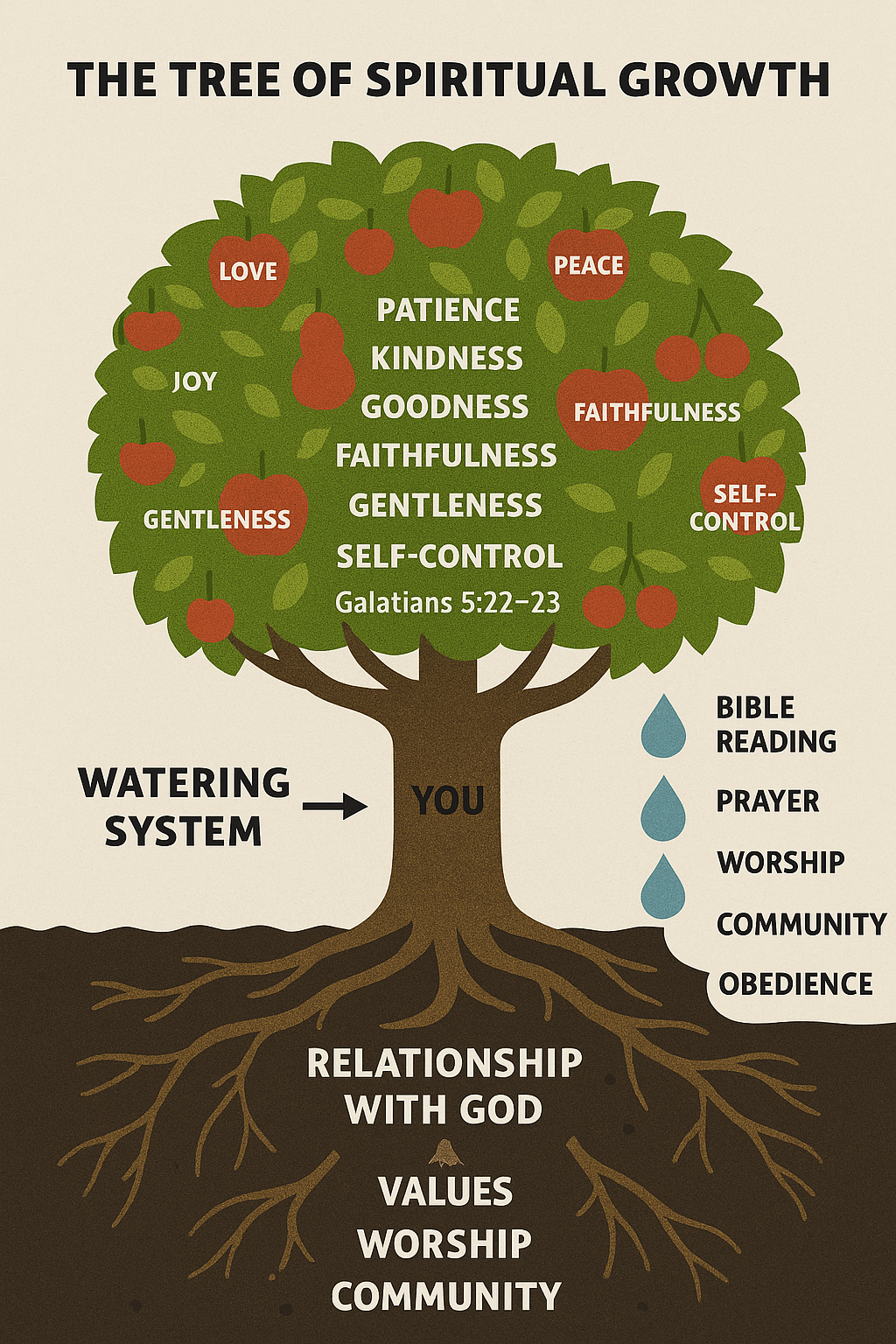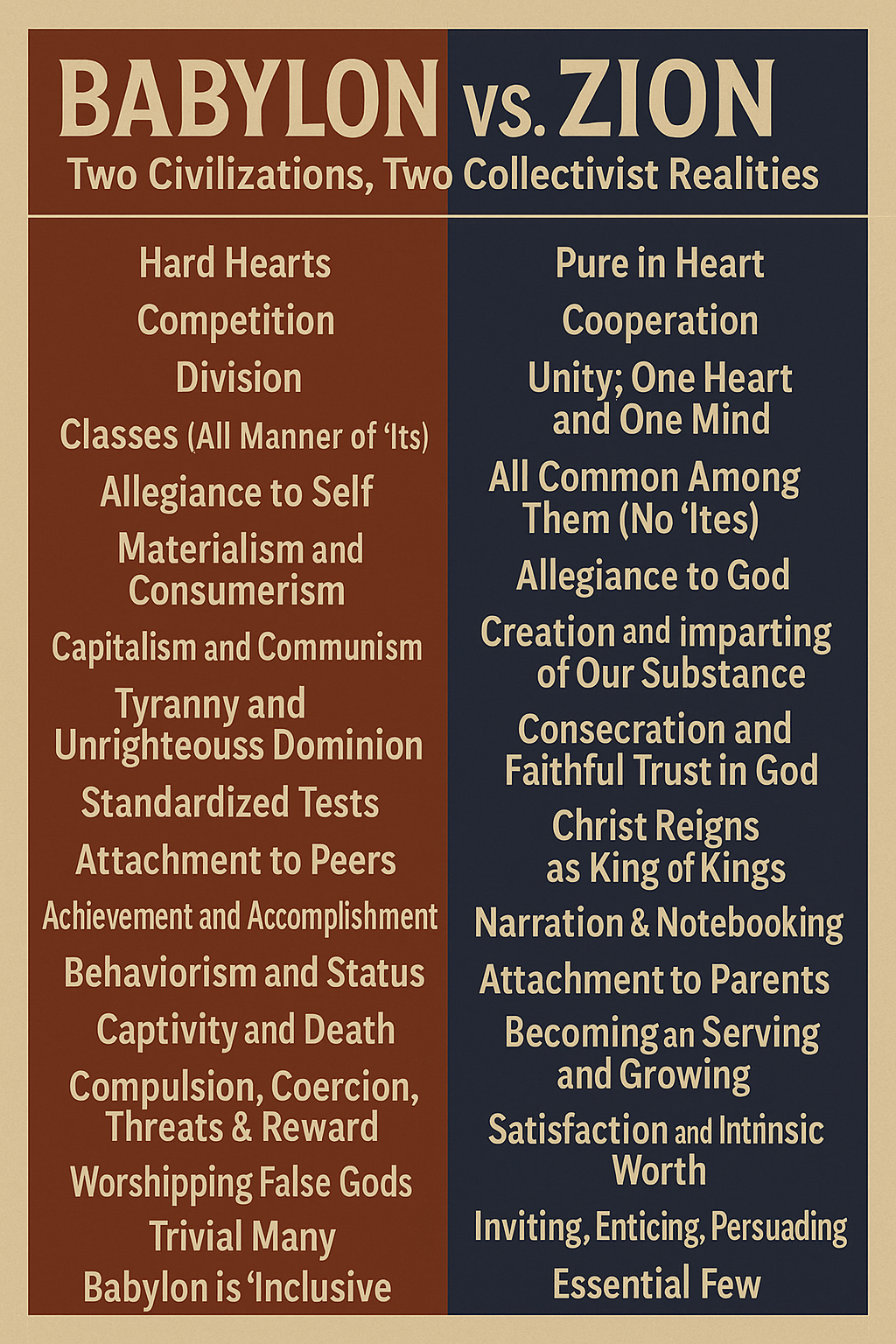“Christians need to hear this. Everybody thinks you’re spiritual based on your watering system. Did you read the Bible today? Did you pray today? Did you go to church today? Did you do the practices today? But what Jesus examines is the fruit, and that’s how you recognize a tree, which is why the Pharisees, who did read the Bible today, who did pray today, who did go to church today, their fruit sucked, right? So they had a lot of knowledge. They didn’t have much maturity. This was my problem with church people. They got a lot of knowledge and no love church people in quotes, so I mean the negative Pharisaical kind Christians need to hear.”
The watering system and the fruit are inseparably connected in the spiritual life. Let’s break this down in detail by using the metaphor of a tree to understand what Jesus, Scripture, and our own walk are teaching us:
The Tree, the Roots, the Watering System, and the Fruit
- Tree = You (your life, soul, character)
- Roots = Your relationship with God, your values, and worldview
- Watering system = Your spiritual disciplines, habits, and inputs (Bible reading, prayer, worship, fasting, community, etc.)
- Fruit = The outward evidence of the Spirit in your life (Galatians 5:22–23)
The Fruit Cannot Grow Without Water
Jesus said in John 15:4-5:
“Remain in me, as I also remain in you. No branch can bear fruit by itself; it must remain in the vine…apart from me you can do nothing.”
- Without a healthy root system and consistent watering, the tree withers.
- Likewise, without regular spiritual nourishment, your character suffers—especially under pressure.
- You might still do “Christian things,” but your heart gets dry, and your fruit becomes weak, bitter, or fake.
What Is the Watering System?
Bible Reading – Spiritual nutrition
- The Word is described as “living water” and bread for the soul.
- Without it, you’re malnourished and vulnerable to lies, discouragement, and confusion.
Prayer – Heart alignment
- It keeps your spirit open and aligned with God’s will, not just your own.
- It refreshes your inner life and brings supernatural peace and wisdom.
Worship – Re-centering your focus
- Helps shift your attention from self to God.
- Waters your soul with gratitude, humility, and joy.
Community – Spiritual cross-pollination
- Others help you grow, challenge your blind spots, and encourage your faith.
- Iron sharpens iron.
Obedience & Service – Flow of the Spirit
- When you live out what you’re learning, it keeps your spiritual “pipes” from clogging.
- James says faith without works is dead. A tree that only takes and never gives will rot.
What Happens When the Watering System is Broken or Imitated?
- Like you mentioned earlier: “Did you read today? Did you pray? Did you go to church?”
These can be healthy watering practices—but if done only out of obligation or pride, they become dry rituals.
The Pharisees had all the watering systems—Bible study, prayer, fasting—but no fruit. Why? Because the system was disconnected from love, humility, and real connection with God.
Jesus rebuked them in Matthew 23:25:
“You clean the outside of the cup and dish, but inside they are full of greed and self-indulgence.”
Fake watering produces fake fruit—plastic, waxy, good-looking on the outside but rotten on the inside.
Fruit Is the Evidence—but Watering Is the Root Cause
You can’t force fruit. You can only cultivate it through care, discipline, and connection.
True fruit like love, joy, peace, patience, etc., is a natural byproduct of a spiritually nourished life.
- If someone is bitter, angry, impatient, or anxious all the time—it’s not a behavior problem.
It’s a watering problem. Their inner life is dry.
Balancing System and Substance
- It’s not either/or. We need spiritual practices (watering), but those practices must be connected to relationship (roots) and transformation (fruit).
- Christianity is not performance-based religion; it’s about deep, daily communion with the Living God.
- The fruit proves the root. But the root needs watering.
Let’s dive into what the “fruit of the Spirit” is and how it contrasts with mere religious performance.
The Fruit of the Spirit (Galatians 5:22-23)
The Apostle Paul writes in Galatians 5:22-23 (NIV):
“But the fruit of the Spirit is love, joy, peace, forbearance, kindness, goodness, faithfulness, gentleness and self-control. Against such things there is no law.”
These are not rules or duties, but rather evidence—signs that God’s Spirit is truly living and active in a person.
Breaking Down Each Fruit in Detail:
Love (Agape)
Unselfish, sacrificial, and unconditional care for others. This is the highest Christian virtue—valuing others above self.
Joy
A deep and abiding inner rejoicing that’s not dependent on external circumstances. It’s rooted in trust in God.
Peace
Not just absence of conflict, but harmony, wholeness, and contentment—even in chaos. Peace with God, others, and self.
Patience (Forbearance)
The ability to endure difficult people or circumstances without frustration or retaliation. Long-suffering and slow to anger.
Kindness
Tender concern for others. Willingness to help, encourage, and support, especially when not obligated.
Goodness
Moral integrity and virtue in action. Choosing what’s right even when no one is watching.
Faithfulness
Dependability, trustworthiness, and loyalty to God and to others. Staying committed through trials.
Gentleness
Strength under control. Humility and grace in how we treat others—not harsh, abrasive, or proud.
Self-control
Mastery over one’s desires, emotions, and impulses. Living by conviction, not by compulsion or momentary feelings.
Why Jesus Looks at Fruit, Not Just Roots or Rituals:
- Jesus said in Matthew 7:16-20 that we would know people “by their fruits.” Not by how much they know, how often they attend church, or how eloquently they pray—but by how they live and love.
- The Pharisees had religious habits, but their fruit—judgment, pride, greed, and hypocrisy—revealed the absence of the Spirit.
Religious Performance vs. Spiritual Fruit:
| Religious Performance | Spiritual Fruit |
|---|---|
| Focused on rules and appearances | Focused on heart and transformation |
| May pray, read, and attend church | Loves, forgives, and bears burdens |
| Often rooted in fear or pride | Rooted in grace and trust in God |
| External validation | Internal transformation |
| Works for approval | Lives from God’s approval |
What Does This Mean for Us?
- You can have knowledge without transformation.
The Spirit doesn’t just want to inform us but to transform us. - You can be theologically right and relationally wrong.
If your knowledge leads to pride instead of humility and service, it’s not Spirit-led. - Maturity is measured by fruit, not familiarity.
Someone with love, joy, and patience may be spiritually deeper than someone who’s mastered theology but lacks empathy.
Let’s go deeper into how to cultivate the Fruit of the Spirit in your life. Just like a tree doesn’t try to force fruit but naturally produces it when rooted in good soil, you don’t “force” spiritual fruit—it flows from a healthy relationship with God and spiritual discipline.
How to Cultivate the Fruit of the Spirit
Stay Connected to the Vine (Jesus)
“I am the vine; you are the branches. If you remain in me and I in you, you will bear much fruit; apart from me, you can do nothing.”
— John 15:5
- You don’t bear fruit on your own. Fruit comes from connection.
- This means consistent time in prayer, Scripture, and authentic relationship with Christ.
Daily Practice:
- Start your day with 5-10 mins of silence and prayer. Ask the Holy Spirit to guide your heart.
- Read a portion of Scripture, not just to gain knowledge, but to be shaped by it.
Walk in the Spirit, Not the Flesh
“So I say, walk by the Spirit, and you will not gratify the desires of the flesh.”
— Galatians 5:16
- There’s a battle between the flesh and the Spirit.
- Flesh wants pride, revenge, and selfishness. The Spirit leads to love, peace, and humility.
Daily Practice:
- When you’re tempted to act out of anger, ego, or fear—pause and ask:
“Is this the Spirit or my flesh leading me?”
Prune the Weeds (Repentance)
Fruit doesn’t grow well in crowded, toxic soil. You have to weed out sin and distractions that choke spiritual life.
What to Prune:
- Bitterness
- Envy
- Lust
- Self-righteousness
- Addiction to approval or possessions
Practice:
- End your day asking: “Where did I feed the flesh today instead of the Spirit?”
- Confess it. Ask for a clean heart and renewed focus.
Feed What You Want to Grow
“Whatever you feed grows. Whatever you starve dies.”
You become what you consume. If you’re constantly feeding your mind with media, negativity, fear, or prideful content—it shows in your character.
What to Feed:
- Worship
- Biblical wisdom
- Wise, godly friendships
- Podcasts or books rooted in truth
- Serving others
Practice:
- Choose a weekly media fast (even 1 hour a day) to focus on spiritual things.
- Journal how your thoughts and emotions shift.
Be Rooted in Love
All fruit of the Spirit flows from love, which is the foundation.
“If I speak in tongues… but do not have love, I am nothing.”
— 1 Corinthians 13
Ask yourself:
- Am I being loving right now?
- Is this decision building others up or tearing down?
- Is my motive love or self?
Stay in Community
Fruit grows in gardens, not in isolation.
- Being around others helps shape patience, kindness, and gentleness.
- The church community, small groups, and friendships rooted in accountability are essential.
Practice:
- Be intentional about relationships. Invest in one or two spiritually mature friends.
- Be open to feedback and challenge. Growth is uncomfortable—but necessary.
Summary Table
| Fruit | Cultivation Practice |
|---|---|
| Love | Practice selfless acts; forgive quickly |
| Joy | Cultivate gratitude; dwell on God’s promises |
| Peace | Trust God’s control; meditate on Scripture |
| Patience | Slow down; respond instead of react |
| Kindness | Look for ways to help without being asked |
| Goodness | Live with integrity even when no one is watching |
| Faithfulness | Be consistent in commitments and promises |
| Gentleness | Speak truth with grace; lead with humility |
| Self-control | Set boundaries; practice fasting or simplicity |
Fruit of the Spirit Devotional & Reflection Guide
Duration: 9 Weeks
Theme Verse: “But the fruit of the Spirit is love, joy, peace, patience, kindness, goodness, faithfulness, gentleness, and self-control.” – Galatians 5:22-23
Week 1: LOVE
- Verse: 1 Corinthians 13:4–7
- Focus: Practice unconditional love.
- Action: Do one selfless act each day.
- Reflection: Who needs love in your life right now?
Week 2: JOY
- Verse: Romans 15:13
- Focus: Find joy regardless of circumstances.
- Action: Keep a gratitude journal.
- Reflection: What robs you of joy? How can you reclaim it?
Week 3: PEACE
- Verse: Philippians 4:6–7
- Focus: Rest in God’s peace.
- Action: Spend 10 minutes in silence or prayer daily.
- Reflection: Where do you need peace most?
Week 4: PATIENCE
- Verse: James 1:2–4
- Focus: Endure with grace.
- Action: Practice patience in one frustrating moment daily.
- Reflection: What triggers your impatience?
Week 5: KINDNESS
- Verse: Ephesians 4:32
- Focus: Go out of your way to be kind.
- Action: Send encouragement to someone different each day.
- Reflection: How do you respond when kindness is difficult?
Week 6: GOODNESS
- Verse: Psalm 23:6
- Focus: Be intentional with doing what is right.
- Action: Do one anonymous good deed each day.
- Reflection: Is your goodness consistent or situational?
Week 7: FAITHFULNESS
- Verse: Lamentations 3:22–23
- Focus: Stay true in relationships and commitments.
- Action: Recommit to one area you’ve been neglecting.
- Reflection: Where has your faithfulness wavered?
Week 8: GENTLENESS
- Verse: Proverbs 15:1
- Focus: Respond softly, even in conflict.
- Action: Choose gentle words in every interaction today.
- Reflection: Do people feel safe opening up to you?
Week 9: SELF-CONTROL
- Verse: 2 Timothy 1:7
- Focus: Choose spirit over impulse.
- Action: Identify and fast from one habit that lacks control.
- Reflection: What area of life needs the most discipline?







